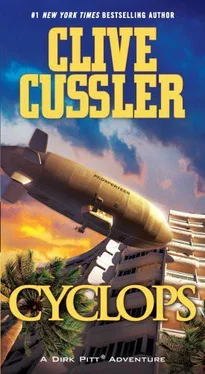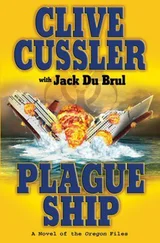Pitt observed the slothful movement of the Ozero Baykai through a pair of night glasses. Fortunately the ebb tide was working in their favor, pulling the behemoth farther from the core of the city.
He had found a self-contained breathing unit and searched the holds for any sign of a detonating device, but could find nothing. He came to the conclusion it must have been buried somewhere under the ammonium nitrate in one of the middle cargo holds. After nearly two hours, he climbed to the main deck and thankfully breathed in the cool breeze off the sea.
Pitt's watch read 4:30 when the Pisto came about and returned to the docks. She made straight for the munitions ship. Jack backed her in until Moe's men hauled in the tow wire that was unreeled from the great winch on the stern of the tug and made fast to the Ozero Zaysan's aft bollards. The lines were cast off, but just as the Pisto prepared to pull, a military convoy of four trucks came roaring onto the wharf.
Pitt dropped down the gangway and hit the dock at a dead run. He dodged around a loading crane and stopped at the stern line. He heaved the fat, oily rope off the bollard and let it fall in the water. There was no time to cast off the bow line. Heavily armed men were dropping from the trucks and forming into combat teams. He climbed the gangway and engaged the electric winch that lifted it level with the deck to prevent any assault from the wharf.
He snatched up the bridge phone and rang the engine room. "Manny, they're here" was all he said.
"I've got vacuum and enough steam in one boiler to move her."
"Nice work, my friend. You shaved off an hour and a half."
"Then let's haul ass."
Pitt walked over to the ship's telegraph and moved the pointers to Stand By. He threw the helm over so the stern would swing away from the pier first. Then he rang for Dead Slow Astern.
Manny rang back from the engine room and Pitt could feel the engines begin to vibrate beneath his feet.
Clark realized with sudden dismay that his small group of men were greatly outnumbered and any escape route cut off. He also discovered that they were not up against ordinary Cuban soldiers but an elite force of Soviet marines. At best he might gain a few minutes' grace-- enough time for the ships to move clear of the docks.
He reached into a canvas bag hanging from his belt and took out a grenade. He stepped from the shadows and lobbed the grenade into the rear truck. The explosion came like a dull thump, followed by a brilliant flash of flame as the fuel tank burst. The truck seemed to blossom outward, and men were thrown across the dock like fiery bowling pins.
He ran through the dazed and disorganized Russians, leaping over the screaming injured who were rolling around the dock desperately trying to douse their flaming clothing. The next detonations came in rapid succession, echoing across the bay, as he heaved three more grenades under the remaining trucks.
Fresh flame and clouds of smoke billowed above the roofs of the warehouses. The marines frantically abandoned their vehicles and scrambled for their lives out of the holocaust. A few were galvanized into action and began firing into the darkness at anything that vaguely resembled a human form. The ragged fusillade mingled with the sound of shattering glass as the windows of the warehouses were blown away.
Clark's small team of six fighters held their fire. The few shots that came in their direction went over their heads. They waited as Clark mingled in the disorganized melee, unsuspected in his Cuban officer's uniform, cursing in fluent Russian and ordering the marines to regroup and charge up the wharf.
"Form up! Form up!" he shouted excitedly. "They're running away. Move, damn you, before the traitors escape!"
He broke off suddenly as he came face to face with Borchev. The Soviet major's mouth fell open in total incredulity and before he could close it Clark grabbed him by the arm and hurled him over the dock into the water. Fortunately, no one took notice amid the confusion.
"Follow me!" Clark yelled, and began running up the dock where it passed between two warehouses. Individually, and in groups of four or five, the Soviet marines raced after him, crouching and zigzagging in highly trained movements across the wharf, laying down a sheet of fire as they advanced.
They seemed to have overcome the paralyzing shock of surprise and were determined to retaliate against their unseen enemy, never knowing they were escaping from one nightmare and entering another. No one questioned Clark's orders. Without their commander to tell them otherwise, the noncoms exhorted their men to follow the officer in the Cuban uniform who was leading the attack.
When the marines had dodged their way between the warehouses, Clark threw himself flat as though hit. It was the signal for his men to open up. The Soviets were hit from all sides. Many were cut off their feet. They made perfect targets, silhouetted by the blazing pyre of the trucks. Those who survived the scything sweep of death returned the fire. The staccato crash of sound was deafening as shells thudded into wooden walls and human flesh or missed and richocheted, whining into the night.
Clark rolled violently toward the cover of a packing crate, but was struck in the thigh and again by a bullet that passed through both wrists.
Badly battered, but still fighting, the Soviet marines began to pull back. They made a futile attempt to break out of the dock area and reach the safety of a concrete wall running along the main boulevard, but two of Clark's men laid down a hail of fire that stopped them in their tracks.
Clark lay there behind the crate, blood streaming from shattered veins, his life draining away, and he was helpless to stop it. His hands hung like broken tree limbs, and there was no feeling in his fingers. Blackness was already closing in when he dragged himself to the edge of the pier and stared out over the harbor.
The last sight his eyes were to ever see was the outline of the two cargo ships against the lights on the opposite shore. They were swinging clear of the docks and turning toward the harbor entrance.
<<71>>
While the battle was raging on the wharf, the little Pisto took the tow and began pulling the Ozero Zaysarv into the harbor stern first. Struggling mightily, she buried her huge single propeller in the oily water and boiled it into a cauldron of foam.
The 20,000-ton vessel began to move, her formless bulk animated by orange flames as she slipped into open water. Once free of the docks Jack made a wide 180-degree sweep, pivoting the munitions ship until her bow faced the harbor entrance. Then the tow wire was released and winched in.
In the wheelhouse of the Amy Bigalow Pitt gripped the helm and hoped something would give. He tensed, scarcely daring to breathe. The still-fastened bowline came taut and creaked from the tremendous stress placed on it by the backing vessel and stoutly refused to snap. Like a dog straining at a leash, the Amy Bigalow tucked her bow slightly, increasing the tension. The rope held, but the bollard was torn from its dock mountings with a loud crunch of splintered wood.
A tremor ran through the ship and she gradually began to back away into the harbor. Pitt put the wheel over and slowly the bows came around until she had turned broadside to the receding dock. The vibration from the engine smoothed out and soon they were quietly gliding astern with a light wisp of smoke rising from the funnel.
The whole waterfront seemed to be ablaze, the flames from the burning trucks casting an eerie, flickering light inside the wheelhouse. All hands except Manny came up from the engine room and stood by on the bow. Now that he had room to maneuver, Pitt spun the wheel hard to starboard and rang Slow Ahead on the telegraph. Manny answered and the Amy Bigalow lost sternway and began to creep slowly forward.
Читать дальше












